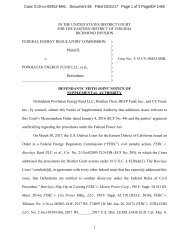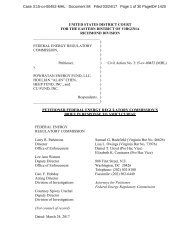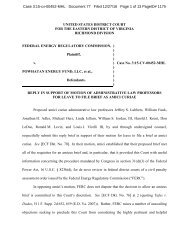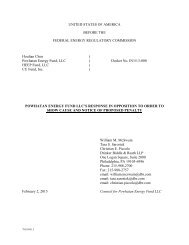FERC-v.-Barclays-180-1-Proposed-Brief
FERC-v.-Barclays-180-1-Proposed-Brief
FERC-v.-Barclays-180-1-Proposed-Brief
You also want an ePaper? Increase the reach of your titles
YUMPU automatically turns print PDFs into web optimized ePapers that Google loves.
Case 2:13-cv-02093-TLN-DB Document <strong>180</strong>-1 Filed 11/07/16 Page 10 of 45<br />
1<br />
2<br />
3<br />
4<br />
5<br />
6<br />
7<br />
8<br />
9<br />
10<br />
11<br />
12<br />
13<br />
14<br />
15<br />
16<br />
17<br />
18<br />
19<br />
20<br />
21<br />
22<br />
23<br />
24<br />
25<br />
26<br />
27<br />
28<br />
The rise since the 1970s of administratively assessed civil penalties can be traced, in large<br />
part, to the landmark study by Professor Harvey Goldschmid conducted for ACUS in 1972. 2 The<br />
ACUS study led to a sea change in the way civil penalty assessments are adjudicated, and<br />
Professor Funk’s description of this study and its impact is definitive and deserves a lengthy<br />
quotation:<br />
[I]n 1972, when Professor Goldschmid made his report to the Administrative<br />
Conference on civil money penalties, he concluded that of the 104 civil penalty<br />
provisions he identified, only four involved “true administrative imposition” of<br />
penalties. The others required the agency to “be successful in a de novo<br />
adjudication in a district court (whether or not an administrative proceeding had<br />
previously occurred) before a civil money penalty could be imposed.” In order to<br />
provide agencies more enforcement flexibility, particularly by avoiding the<br />
necessity of obtaining approval of the Department of Justice, and at the same time<br />
to enhance fairness, Professor Goldschmid recommended increased use of<br />
administratively imposed penalties that would not require de novo judicial<br />
proceedings to enforce. Rather, persons who wished to contest a penalty would<br />
have the opportunity for a hearing under Sections 554, 556, and 557 of the APA.<br />
Such adjudications, Professor Goldschmid wrote, should be “just, inexpensive,<br />
and speedy.” The administrative decision would be final unless appealed within a<br />
limited period to a federal court, where the review would be limited to substantial<br />
evidence review under the APA.<br />
The Administrative Conference, thereafter, formally adopted a<br />
recommendation approving the increased use of civil money penalties as an<br />
alternative to criminal penalties and other draconian measures. [See ACUS Rec.<br />
72-6, Civil Money Penalties as a Sanction, 38 Fed. Reg. 19,792, 19,792-93<br />
(July 23, 1973).] It also recommended the administrative imposition of those<br />
penalties, at least where the penalty amount is small (less than $5000) and is<br />
imposed pursuant to a system affording parties an opportunity for a hearing on the<br />
record under Sections 554, 556, and 557 of the APA.<br />
By 1979, when the Administrative Conference next addressed the issue,<br />
the number of civil penalty provisions had mushroomed. Professor Diver’s report<br />
to the Administrative Conference on administrative civil penalties [see Colin<br />
Diver, The Assessment and Mitigation of Civil Money Penalties by Federal<br />
Administrative Agencies, 1979 ACUS 203, available at<br />
http://hdl.handle.net/2027/uc1.b5156006?urlappend=%3Bseq=209; published in<br />
abridged form, 79 COLUM. L. REV. 1435 (1979)] identified 141 “agencyassessment”<br />
penalty provisions as well as 207 “court-assessment” provisions. Of<br />
these 141 “agency-assessment” provisions, however, Professor Diver believed<br />
that not all involved “true administrative imposition” of penalties. Because a<br />
“full-scale trial-type hearing must be provided before a civil penalty can be<br />
exacted,” Professor Diver stated, true administrative imposition of penalties could<br />
only occur where those type of hearings were provided by the agency. Only 27 of<br />
the 141 “agency-assessment” provisions provided explicitly for a formal hearing<br />
2<br />
Harvey J. Goldschmid, An Evaluation of the Present and Potential Use of Civil Money<br />
Penalties as a Sanction by Federal Administrative Agencies, 2 RECOMMENDATIONS AND REPORTS<br />
OF THE ADMINISTRATIVE CONFERENCE OF THE UNITED STATES 896 (1972), available at<br />
http://hdl.handle.net/2027/mdp.39015078601575?urlappend=%3Bseq=910.<br />
5<br />
PROPOSED AMICI CURIAE BR. OF ADMIN. LAW PROFESSORS LUBBERS, FUNK ET AL.






